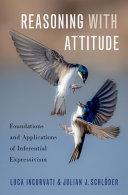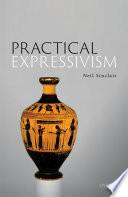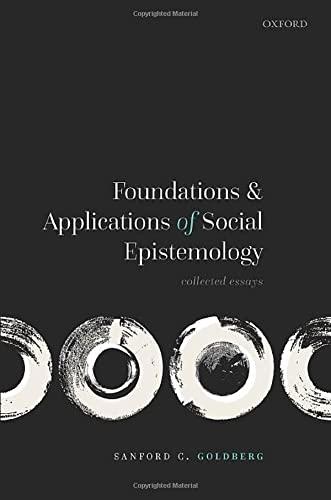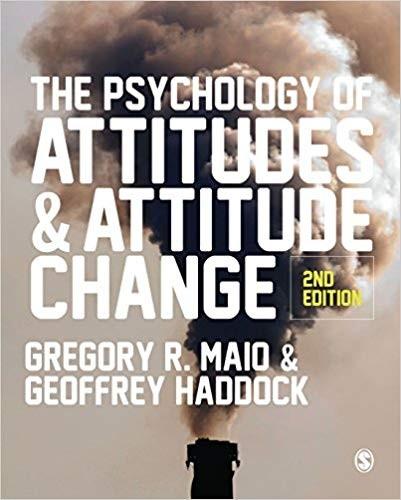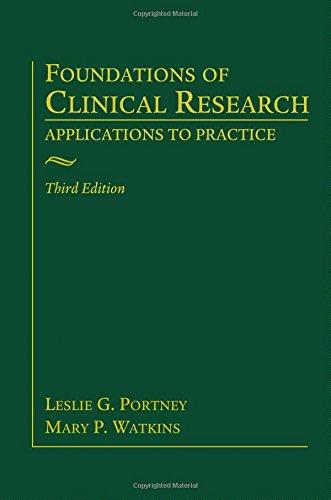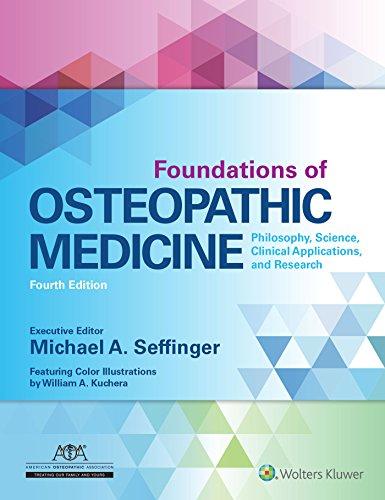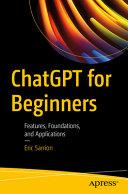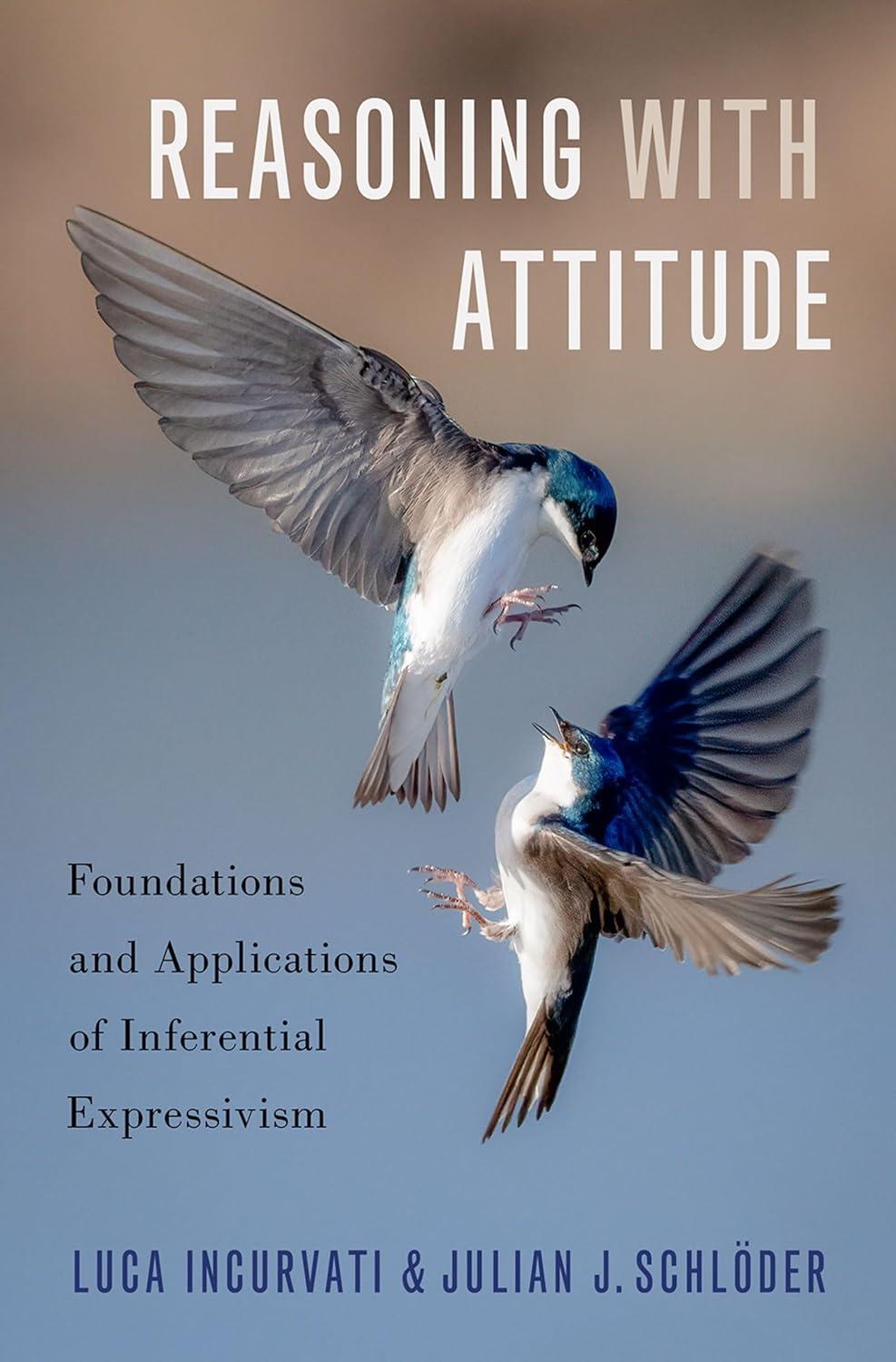Reasoning with Attitude: Foundations and Applications of Inferential Expressivism Luga Incurvati Visit to download the full and correct content document: https://ebookmass.com/product/reasoning-with-attitude-foundations-and-applicationsof-inferential-expressivism-luga-incurvati/
More products digital (pdf, epub, mobi) instant download maybe you interests ...
Practical Expressivism Neil Sinclair
https://ebookmass.com/product/practical-expressivism-neilsinclair/
Foundations and Applications of Social Epistemology: Collected Essays Sanford C. Goldberg
https://ebookmass.com/product/foundations-and-applications-ofsocial-epistemology-collected-essays-sanford-c-goldberg/
Foundations of info-metrics: modeling and inference with imperfect information Golan
https://ebookmass.com/product/foundations-of-info-metricsmodeling-and-inference-with-imperfect-information-golan/
Fault-Tolerant Attitude Control of Spacecraft Qinglei
Hu
https://ebookmass.com/product/fault-tolerant-attitude-control-ofspacecraft-qinglei-hu/
Career Counseling: Foundations, Perspectives, and Applications 3rd Edition, (Ebook PDF)
https://ebookmass.com/product/career-counseling-foundationsperspectives-and-applications-3rd-edition-ebook-pdf/
(eTextbook PDF) for The Psychology of Attitudes and Attitude Change 2nd Edition
https://ebookmass.com/product/etextbook-pdf-for-the-psychologyof-attitudes-and-attitude-change-2nd-edition/
Foundations of Clinical Research Applications To Practice 3rd Edition, (Ebook PDF)
https://ebookmass.com/product/foundations-of-clinical-researchapplications-to-practice-3rd-edition-ebook-pdf/
Foundations of Osteopathic Medicine: Philosophy, Science, Clinical Applications, and Research 4th Edition, (Ebook PDF)
https://ebookmass.com/product/foundations-of-osteopathicmedicine-philosophy-science-clinical-applications-andresearch-4th-edition-ebook-pdf/
ChatGPT for Beginners: Features, Foundations, and Applications 1st Edition Eric Sarrion
https://ebookmass.com/product/chatgpt-for-beginners-featuresfoundations-and-applications-1st-edition-eric-sarrion/
ReasoningwithAttitude ReasoningwithAttitude FoundationsandApplicationsof InferentialExpressivism LUCAINCURVATI AND JULIANJ.SCHLÖDER OxfordUniversityPressisadepartmentoftheUniversityofOxford. ItfurtherstheUniversity’sobjectiveofexcellenceinresearch,scholarship, andeducationbypublishingworldwide.Oxfordisaregisteredtrademarkof OxfordUniversityPressintheUKandincertainothercountries. PublishedintheUnitedStatesofAmericabyOxfordUniversityPress 198MadisonAvenue,NewYork,NY10016,UnitedStatesofAmerica.
©OxfordUniversityPress2023
Somerightsreserved.Nopartofthispublicationmaybereproduced,storedin aretrievalsystem,ortransmitted,inanyformorbyanymeans,forcommercialpurposes, withoutthepriorpermissioninwritingofOxfordUniversityPress,orasexpressly permittedbylaw,bylicenceorundertermsagreedwiththeappropriate reprographicsrightsorganization.
Thisisanopenaccesspublication,availableonlineanddistributedunderthetermsofa CreativeCommonsAttribution–NonCommercial–NoDerivatives4.0 Internationallicence(CCBY-NC-ND4.0),acopyofwhichisavailableat http://creativecommons.org/licenses/by-nc-nd/4.0/. Youmustnotcirculatethisworkinanyotherformandyoumustimposethissameconditiononanyacquirer
CIPdataisonfileattheLibraryofCongress
DOI:10.1093/oso/9780197620984.001.0001
ISBN978–0–19–762098–4
IntegratedBooksInternational,UnitedStatesofAmerica
Toourparents 4.6Weakassertions,epistemicmodalassertions,andevidence116
7.1Traditionalexpressivismabouttruth
9.3Moderateassertionandmoderaterejection
Preface Words,sentences,andlanguagesareendowedwithmeaning.Language allowsustoconveythoughtsabouteventsoccurringindistantplaces,andto coordinateonactionstobeundertakenbyourfutureselves.Butwhatdoes themeaningoflinguisticexpressionsconsistin?Alongstandingviewinthe historyofphilosophy,tracingatleastasfarbackasPlato’sCratylus,identifies themeaningofanexpressionwithwhatitstandsfor—itsreference.This viewisknownasreferentialismandhasbecomesomethingofaparadigm withinthestudyofmeaning.Thisisnodoubtdue,atleastinpart,tothe successofformalsemantics,whichhasovertheyearsprovidedincreasingly sophisticatedreferentialanalysesofthecontributionofalargenumberof expressionstothemeaningofthesentencesinwhichtheyoccur.
Thisisnottosaythatreferentialismhasgoneunchallenged.Onestrand ofoppositioncomesfromtheexpressivistanalysisofmoralvocabulary. Expressivismemergedintheheydayoflogicalpositivismasanattemptto reconcilemoraldiscoursewithanempiricistmetaphysicsandhassincethen hadmanyreincarnations.Thesereincarnationssharetheideathatmeaning istobeexplainedintermsofspeechacts,whichprovidelinguisticexpression toourinnerlives.Anotherstrandofoppositiontoreferentialismcomesfrom theinferentialistanalysisoflogicalvocabulary.Inferentialismhasitsroots inWittgenstein’sremarksinthe PhilosophicalInvestigations thatmeaningis use,andtakesthemeaningofexpressionstobeexplainedintermsoftheir roleininferences.
Acentralcontentionofthisbookisthat,theirdifferencesnotwithstanding,expressivismandinferentialismarebestseenasopposingreferentialism onthebasisofthesamepragmatistinsight:thatsemanticexplanations shouldnotgobeyondwhatisneededtoexplaintheroleofwordsinour practices.Expressivistsfocusontheattitudesthatwordsareusedtoexpress; inferentialistsfocusontheinferencesthatwordsareusedtodraw.Inthis book,welaythefoundationsforinferentialexpressivism,atheoryofmeaning whichcountenancesbothaspectsofourlinguisticpracticeandexplains meaningintermsoftheinferenceswedrawinvolvingtheattitudeswe express.
Inferentialismandexpressivismfacechallengesoftheirown.Thehistory ofethicalexpressivismanditsmanyreincarnationsis,atleastinpart, thehistoryofthestruggletoaccountforthebehaviourofexpressionsin embeddedcontexts.ThisisthecoreofwhatisknownastheFrege–Geach Problem.Inferentialism,foritspart,hasremainedlimitedinscope,somuch sothatdoubtshavebeenrightlyraisedaboutitsabilitytoprovideatheory ofmeaningforexpressionsotherthansimplelogicalconstantssuchas and and or.
Wearguethat,byjoiningforces,expressivismandinferentialismcan meettheirkeychallenges.Byexplainingmeaninginferentially,wecontend, expressivistscansolvetheFrege–GeachProblem.Theproblem,asweshow, arisesnotonlyinmeta-ethics,butinseveraldomainsinwhichanexpressivistanalysisiscalledfor.Theresourcesofinferentialismaffordexpressivists themeansofsolvingtheproblemacrosstheboard.Byenrichingtheirrepertoirewithattitudeexpressionsofvariouskinds,inturn,inferentialistscan providesemanticanalysesofavarietyoflinguisticitemsgoingwellbeyond thesimplelogicalconstants.Wedemonstratethisbyprovidingapplications oftheinferentialexpressivistapproachtoadiverserangeoflinguisticitems, includingepistemicmodals,probabilityoperators,conditionals,moralpredicates,thetruthpredicate,andpropositionalattitudepredicates.
ReferentialsemanticsistypicallycarriedoutinaTarskianmodeltheoreticframework.Wearguethatinferentialistexpressivistsemantics isbestcarriedoutinwhatwecalla multilateral proof-theoreticframework. Thisframeworkmakesuseofinferencerulesinvolvingformulaedecorated withsignsstandingforspeechactsexpressingattitudes.Weobtainthis frameworkbyextendingstandard bilateral frameworks,whichincludesigns forassertionandrejection,withsignsforspeechactssuchasweakand strongassertion,approvalanddisapproval,andsupposition.Adoptingthis frameworkopensupthepossibilityofdistinguishingbetweentwonotions oflegitimateinference:legitimateinferenceaspreservingcommitmentand legitimateinferenceaspreservingevidence.Onceproperlyincorporated intotheframework,thisdistinctionmotivatesprincipledrestrictionsonthe meta-rulesofclassicallogicandleadstoauniformsolutiontopuzzlesand paradoxesof,amongothers,truth,epistemicmodality,andconditionals.At thesametime,thetheoriesthatwedevelopcanaccountforthelinguisticdata intherelevantdomainsthathavepreoccupiedsemanticistswhilstvalidating allclassicallyvalidarguments.Theprospectsforaresearchprogramme combiningexpressivismandinferentialismarebrightindeed.
Asshouldbeclear,then,therearedifferentthemesrunningthroughthis book:thepragmatistthemeconcerningtheshapeoursemanticexplanations shouldtake;thefoundationalthemeconcerninghowtocombineexpressivismandinferentialismintoanoveltheoryofmeaning;theexpressivist themeconcerninghowtheresultingapproachhastheresourcestosolve theFrege–GeachProblem;theformalsemanticsthemeconcerninghowthe approachcanbeappliedtoproviderichsemantictheoriesofnotionsfrom avarietyofdomains;thelogicalthemeconcerninghowtosolvesemantic andepistemicparadoxesofvariouskinds.Althoughwedeemthesethemes tobeintertwinedandcomplementary,wehopethateachofthemwillbeof interestinitsownright.
Wenowprovideanoutlineofthestructureofthebookandofthecontent ofitstenchapters.Inthefirsttwochapters,weprovideopinionatedintroductionstothesemanticframeworksofexpressivismandinferentialism, theirappealingfeatures,andthedistinctiveproblemstheyface.Weargue thatbothexpressivismandinferentialismarebestmotivatedonthebasis oftheiradherencetoapragmatistapproachtosemantictheorizing.Expressivism,inparticular,complieswiththemeta-theoreticalprinciplewedub the PragmatistRazor,whichunderwritesourchallengestovariousformsof referentialismthroughoutthebook.Wealsomakeastartonsolvingsomeof theproblemsexpressivismandinferentialismareconfrontedwithbutargue inChapter1thattosolvetheFrege–GeachProblemexpressivistshadbetter becomeinferentialists,andinChapter2thattosolvetheProblemofLimited Applicabilityinferentialistshadbetterbecomeexpressivists.
InChapter3,weshowhowtocombineexpressivismandinferentialismintoinferentialexpressivism.Ourpointofdepartureisthebilateralist approachtomeaningwhich,weargue,isbestunderstoodasaformof inferentialexpressivismaboutnegation.Wegoontopresenttheinferential expressivistsolutiontotheFrege–GeachProblemasappliedtothecase ofembeddingsofnegationinconditionalantecedents.Weconcludethe chapterbyarguingthatbilateralismfacestheproblemofweakrejectionsand thattosolvethisproblem,bilateralistsshouldbecomemultilateralists.
InChapter4weshowhowtheextensionfrombilateralismtomultilateralismopensupthepossibilityofsolvingtheProblemofLimitedApplicability. Inparticular,weextendthebasicmultilaterallogicofthepreviouschapter intoanepistemicmultilaterallogicandusethislogicasthebasisforan
inferentialexpressivistexplanationofthemeaningoftheepistemicmodal might.Wenotethatthestrategyusedtoexplainthemeaningof might isan applicationofageneral multilateralmethodology forprovidinginferential expressivistexplanationsofthemeaningoflinguisticitems.
Theremainingchaptersapartfromtheconcludingonedetailapplications ofthemultilateralmethodologytoarriveatinferentialexpressivistaccounts offurtherpiecesofvocabulary.WebeginbyprovidinganinferentialexpressivistaccountofmoralvocabularyinChapter5.Weshowthatthisaccount hastheresourcestoaddressaparticularlystrongversionoftheFrege–Geach Problem,tosolvetheWishfulThinkingProblemforethicalexpressivism, andtoaccountformoralmotivation.
WethenturntoattitudeascriptionsinChapter6.Wegiveaninferential expressivistsemanticsforascriptionsofvariouskindsofattitudesandshow thatthissemanticsiscompatiblewithwhatwedeemtobethecorrectshape ofasolutiontotheManyAttitudesProblemforexpressivism.Wegoonto discussthequestionofrealismaboutthemindfromthepointofviewof inferentialexpressivism.
InChapter7,weprovideaninferentialexpressivistaccountofthetruth predicate.Weprovethattheresultingtheoryoftruthhastheresourcesto provideaprincipledsolutiontothesemanticparadoxesandtheirrevenge versions.Thetheory,moreover,canbeprovablyshowntoshareprofound similaritieswithsupervaluationalapproachestotruth.
InChapter8,wetackleconditionals.Weextendthemultilateralframeworksoastoincludenotonlysignsforcategoricalspeechacts,butalsofor conditionalones.Wethenexplainthemeaningofconditionalsintermsof suchbinaryspeechacts.Weshowthattheresultinginferentialexpressivist accountofconditionalshasseveralattractivefeatures.Notably,itavoids Gibbard’scollapseproblemandCurry’sParadoxinanaturalway.
Asafinalapplicationofthemultilateralmethodology,wepresentin Chapter9aninferentialexpressivistaccountofepistemicusesofprobabilisticvocabulary.Wegiveaninferentialexpressivistanalysisof itisprobablethat whichaccountsforseverallinguisticdataconcerningprobability expressionsandavoidstheFrege–GeachProblem.Weendthechapterby explaininghowtheaccountcanbeextendedtoexpressionsofcomparative probabilityandtoquantitativeprobabilitytalk.
WeconcludethebookinChapter10byillustratingtheroadaheadfor theinferentialexpressivistapproachtomeaning.Wepresentanumberof
furtherpossibleapplicationsoftheapproachandoutlinehowonemaygo aboutcarryingouttheseapplications.
Someofthechaptersarebasedonmaterialthathasappearedelsewhere,thoughofteninaverydifferentform.Chapter3drawson‘Weak rejection’(AustralasianJournalofPhilosophy,2017),Chapter4drawson ‘Weakassertion’(PhilosophicalQuarterly,2019)and‘Epistemicmultilateral logic’(ReviewofSymbolicLogic,2022a),Chapter5drawson‘Inferential expressivismandthenegationproblem’(OxfordStudiesinMetaethics,2021), andChapter7drawson‘Inferentialdeflationism’(PhilosophicalReview, Forthcoming).Wearegratefultotheeditorsandpublishersforpermission tousematerialfromthesearticles.
On13June2014the LoLaDay tookplaceattheUniversityofAmsterdam. Duringthismeeting,severalmembersoftheLogicandLanguage(LoLa) groupoftheInstituteforLogic,LanguageandComputationgavetalkson aspectsoftheircurrentresearch.Webothpresentedmaterialonthespeech actofrejection.Havingdiscoveredthatwewerebothworkingonwhatwe consideredanunjustlyneglectedtopic,wedecidedtoexchangenotes.So beganthecollaborationthatledtothisbook.WewouldliketothankFranz BertoandRobertvanRooijfororganizingthatmeetingasheadsofLoLaat thetime.
Overtheyears,thematerialinthisbookhasbenefittedfromconversations andfeedbackfrommanyfriendsandcolleagues.Weareespeciallygrateful toMariaAloni,DanielAltshuler,NicholasAsher,BahramAssadian,Dorit Bar-On,FranzBerto,AriannaBetti,JustinBledin,PaulBloomfield,Lwenn Bussière,TimButton,MatthewChrisman,MariangelaCocchiaro,Paul Dekker,ImogenDickie,CianDorr,RaquelFernández,FilippoFerrari, StephenFinlay,SalvatoreFlorio,MelissaFusco,ManuelGarcía-Carpintero, LewisGordon,MagdalenaKaufmann,AngelikaKratzer,ManfredKrifka, AlexLascarides,HannesLeitgeb,BillLycan,MichaelLynch,Matthew Mandelkern,TeresaMarques,ThomasMüller,JulienMurzi,CarloNicolai, AlejandroPérezCarballo,FrancescaPoggiolesi,HuwPrice,GregRestall, DaveRipley,LucasRosenblatt,MarcusRossberg,LorenzoRossi,Giorgio Sbardolini,ThomasSchindler,LionelShapiro,StewartShapiro,Sebastian Speitel,UnaStojnić,MartinStokhof,ChristineTiefensee,RobertvanRooij, FrankVeltman,JackWoods,andHeddeZeijlstra.Wewouldalsoliketo
thankPeterOhlinandtheteamatOxfordUniversityPressfortheirhelp andsupportthroughoutthewritingandproductionprocess.
Wehavepresentedsomeofthematerialinthisbookinanumberof forums.WearegratefultotheorganizersandaudiencesoftheMathematical LogicColloquiumattheUniversityofBonn,theTheoreticalPhilosophyColloquiumatUtrechtUniversity,thePLMMasterclasswithAngelikaKratzer attheUniversityofSalzburg,thePhilosophyColloquiumattheUniversity ofGothenburg,theNewYorkPhilosophyofLanguageWorkshop,theXIV AnnualMadisonMetaethicsWorkshop,theSemanticsandPhilosophyin Europe11ConferenceattheUniversityofWarsaw,theHigherSeminar inTheoreticalPhilosophyatUppsalaUniversity,theMondayColloquium attheUniversityofBonn,theWorkshoponPropositions,Properties,Sets, andOtherAbstractObjectsattheUniversityofAmsterdam,theSPAGAD2 WorkshopandtheMini-WorkshoponDiscourseoftheZAS(Berlin),the LogicColloquiumattheMunichCenterforMathematicalPhilosophy, theLogicColloquiumandPhilosophyColloquiumattheUniversityof Konstanz,theLondonGroupforFormalPhilosophy,theWorkshopon ClassicalandNon-ClassicalApproachestoParadoxesattheUniversityof BuenosAires,thevonWeizsäckerColloquiumattheUniversityofTübingen, thePhilosophyofHybridRepresentationsreadinggroupattheUniversityofBarcelona,theLogicColloquiumattheUniversityofConnecticut, theVarietiesofPhilosophicalExpressivismWorkshopattheUniversityof Mannheim,andtheRhinelandExpressivismWorkshopattheUniversityof Bonn.WearealsogratefultotheaudiencesoftheEXPRESSWorkshops onBilateralApproachestoMeaningandonExpressivistApproachesto Meaning,whichweorganizedattheUniversityofAmsterdamtogetherwith LwennBussièreandGiorgioSbardolini.
ThisworkhasreceivedfundingfromtheEuropeanResearchCouncil (ERC)undertheEuropeanUnion’sHorizon2020researchandinnovation programme(grantagreementNo.758540)withintheproject Fromthe ExpressionofDisagreementtoNewFoundationsforExpressivistSemantics (EXPRESS).TheERCfundingmadeitpossibletodevoteourselvesfulltime tothisprojectandtopublishthebookopenaccess.Wearedeeplygrateful. Finally,beforewebegin,somewordsfromeachofusindividually.
FromLuca: ThankyoutoJulianforbeingsuchawonderfulcollaborator andforbeingsomuchfuntoworkwith;toTimSmileyforintroducingme torejectionwhenIwasagraduatestudent;totheCambridgepragmatists forinfluencingmeinwaysthatIamonlynowfullyrealizing;toSarahfor
hercontinuousloveandnotmindingtoomuchmetestingheracceptability judgementsaboutembeddedepistemicmodals;toTommasoforbringingso muchjoytomylife;andtomyparentsforalwaysbelievinginme.
FromJulian:IamgratefultoLucaforbeing,overtheyears,anoutstanding advisor,supervisor,colleague,andco-author;toRaquelFernández,Alex Lascarides,andPaulDekkerfortheirteachingswhichhavestayedwithme morethantheymightknow;toYu’anforherloveandtolerationoflatenights working;andtomyparentsfortheirunwaveringsupport.
3.1.CoordinationprinciplesinBasicMultilateralLogic
Expressivism Thisbookpresentsanddevelops inferentialexpressivism,anovelapproach tothestudyofmeaningwhichcombineselementsoftheinferentialist andexpressivistprogrammes.Thischapterintroducesexpressivismandthe challengesitfaces.Thenextoneintroducesinferentialism.
Bothexpressivismandinferentialismcomeinlocalandglobalvarieties. Globalapproachestomeaningtaketheircentraltenetstoapplyacrossthe board;localapproachesrestrictattentiontosomespecificsetofexpressions orsomeparticularareaofdiscourse.Historically,expressivismoriginatedas anapproachtothemeaningandfunctionofmoralvocabulary,sowefocus inthischapteronethicalexpressivism,butmuchofwhatwesaycanbeeasily appliedtoexpressivisttreatmentsofotherareas.Weshallindicatewhenthis isnotthecase.
Webeginbyintroducingsomekeydistinctionswithinthetheoryof meaningwhichwillbeusefulintheremainderofthebook.Wethenpresent whatwesee(andareoftenseen)asthetwomainconcernsthathave beenparticularlyinfluentialintheemergenceanddevelopmentofethical expressivism.Weexplainhowtherelatedviewofspeakersubjectivismcan beseenasanearlyattempttodealwiththeseconcerns.Accordingto ethicalsubjectivism,themeaningofmoralvocabularyconsistsin reports ofattitudes,andtheconstitutivefunctionofmoralstatementsistoreport theseattitudes.Speakersubjectivismfacestheproblemofaccountingfor thephenomenonofmoraldisagreement.Thisproblemmotivatesthefocus on expressions ofattitudes,whichisthecentralinnovationofexpressivism. Traditionalethicalexpressivismtakesthemeaningofmoralvocabularyto consistinexpressionsofattitudes,andthefunctionofmoraljudgementsto bethatofexpressingtheseattitudes.
Traditionalexpressivismfacesanumberofproblems,whichwealso introduceinthischapter.Ofthese,theso-called Frege–GeachProblem is perhapsthebestknown,andtheonethathashistoricallybeenregarded asathorninthesideofexpressivism.Indeed,sophisticatedandhybrid formsofexpressivismhavebeendeveloped,atleastinpart,inresponseto
ReasoningwithAttitude:FoundationsandApplicationsofInferentialExpressivism.LucaIncurvatiand JulianJ.Schlöder,OxfordUniversityPress.©OxfordUniversityPress2023. DOI:10.1093/oso/9780197620984.003.0001
thisproblem.Oneofthecentralcontentionsofthebookisthatinferential expressivismoffersthebestavailablesolutiontothisproblem,asitarisesnot onlyintheethicaldomain,butinotherdomainsaswell.
1.1Semantics,postsemantics,andmeta-semantics Thisbookisconcernedwiththetheoryofmeaning.Philosophershave historicallyassigneddifferentmeaningsto‘theoryofmeaning’.Thecentraldistinctionhere,whichhasbecomecustomaryinrecentyears,isthat betweensemanticsandmeta-semantics(Kaplan1989a).
Semantics isconcernedwiththeassignmentofsemanticvaluestothe expressionsofalanguage.Semantictheoriesaretypically compositional: theyassignsemanticvaluestothesimpleexpressionsofthelanguage, anddeterminethesemanticvalueofcomplexexpressionsasafunctionof thesemanticvalueofthesimplerones.Thecompositionalityofsemantic theoriesisintendedtoaccountforthefactthatspeakerscanunderstandand producecomplexexpressionswhichtheyhaveneverencounteredbefore.
Instandard, referential semantictheories,expressionsareassigneddenotationsastheirsemanticvalues.Thatis,areferentialsemantictheoryspecifiesamapping ⋅ fromexpressionstotheirdenotations.Thus,forinstance, thesemantictheorycomputesthesemanticvalueof Andrearests byassigningAndreaasthedenotationof Andrea,therestingfunction—thatisthe functionmappingthethingsthatresttothevalue1andallotherthingsto thevalue0—asthedenotationof rests,anddetermininghowthesesemantic valuescombinetodeterminethesemanticvalueofthesentence.Insymbols, andusingthelambdanotationtorepresentfunctions:
Andrea = Andrea rests =��x.x rests
Andrearests = 1iffAndrearests
Typically,therestingfunctionistakentorepresentthepropertyofresting, andthevalues1and0torepresenttruthandfalsity.Underthisinterpretation,thesemantictheoryspecifiesthetruthconditionsof Andrearests on thebasisofthemeaningofitscomponents.
StandardsemantictheoriesinthetraditionofRichardMontague(1970) orDavidLewis(1970)typicallyassignsemanticvaluestothesimple
semantics,postsemantics,andmeta-semantics3
expressionsrelativetoan indexi,an n-tuplewhoseelementsaretypically takentorepresentthecircumstancesofevaluation.Accordingly,the semanticvalueofasentencewouldbeafunctionfromindicesto0or1. Suppose,forinstance,thattheindexincludeselements w and t,standing, respectively,fortheworldandtimeofevaluation.Thenthesemanticclauses ofourtoyexamplelookasfollows.
t,w = Andrea rests t,w =��x.x restsat t and w
Andrearests t,w = 1iffAndrearestsat t and w
Todealwithindexicalphenomenainlanguage,itiscustomarytoalsotake the contextofutterance intoaccount.Onthestandardpicturegoingback toDavidKaplan(1989b),thisisdonebyrelativizingsemanticvaluesto aparameter c,representingthecontext.ThisiswhatLewis(1980)calls the variable-but-simple-semantic-value approachtosemantics.Onthis approach,semanticvaluesarevariablebecausetheychangefromcontextto context,atleastforsomesentences,suchasthosecontainingindexical vocabulary;theyaresimplebecausethesemanticvaluesofsentences aremerefunctionsfromindicestotruthvalues.Onthe constant-butcomplicated-semantic-value approachtosemantics,bycontrast,semantic valuesareconstantacrosscontexts;theyarecomplicatedbecausethey arefunctionsfromindicesandcontextstotruthvalues.Theconstant-butcomplicated-semantic-valueapproachhasrecentlybeenrevivedinthework ofBrianRabern(2012),SethYalcin(2014),andPaoloSantorio(2019) amongothers.
Thereferentialsemantictheorycomputesasemanticvalueforeach sentenceofthelanguage.Supposing,forsimplicity,thatwehavesettled forthevariable-but-simple-semantic-valueapproach,thesemantictheory specifies,foreachsentence,theconditionsunderwhichthesentencereceives value1(representingtruth)atacontextandatanindex.ThisiswhatJohn MacFarlane(2003)callsthe semanticsproper.Thenextstageistodefine suitablenotionsoftruthandvalidityforthelanguage,thestageMacFarlane callsthe postsemantics.AsMacFarlaneputsit,attheendofthedayweare interestedintruth simpliciter (perhapsrelativizedtoacontext),ratherthan truthatanindex.Butthesemanticsproperaffordsthemeanstodefinetruth simpliciter intermsoftruthatanindex:wecantakeasentencetobetrue simpliciter justincaseitistrueattheindex ic ofthecontextofutterance.
Andrea
Incasetheindex i includesaworldandatime,forinstance, ic willinclude theworldandtimeofthecontextofutterance.Asforvalidity,accordingto thestandarddefinition(andsuppressingcontextsensitivityforsimplicity) anargumentisvalidjustincase,foreveryindex i,ifthepremissesofthe argumentaretrueat i,thentheconclusionistrueat i.Logicaltruthisthen definedasthespecialcaseinwhichthesetofpremissesisempty,thatisby sayingthatasentenceislogicallytruejustincaseitistrueateveryindex.
TheformalsemantictheoryjustdescribedassignsAndreato Andrea andtherestingfunctionto rests (relativetoanindex i).Moreover,it assigns Andrearests afunctionfrom i tothevalues0and1(relativeto theparameter c)asitssemanticvalue.Asnoted,itiscustomarytointerpretthefunctionsassignedtopredicatesasrepresentingthecorresponding properties,sothattherestingfunctionrepresentsthepropertyofresting. Similarly,itiscustomarytointerpretthemembersoftheindexasrepresentingthecircumstancesofevaluationandtheparameter c asrepresenting thecontextofutterance.Finally,thevalues1and0aretypicallyinterpreted asstanding,respectively,fortruthandfalsity.However,allofthisisnot partofthesemantictheory,butratherofthe interpretedsemantictheory: thesemantictheoryunderaparticularinterpretation.Onewayoflooking atthesituationistoconsidertheformalsemanticsasprovidingamodel,and theinterpretationasspecifyingwhattheelementsofthemodelaretaken torepresent.Whattheelementsofthemodelaretakentorepresentisthe answertotheInterpretationQuestion.
InterpretationQuestion. Whatdoesthesemanticvalueofanexpression represent?
Ofcourse,theinterestofasemantictheorytypicallyliesinitscapacityto explainfactsthatbelongtothedomainbeingmodelled,soitistypically interpretedsemantictheoriesthataretheobjectsofinterestsofsemanticists andphilosophers.Thus, referentialists,whoholdthatthemeaningofan expressionisgivenbyitsreferent,willtypicallytake,forinstance,the semanticvalueofapredicatetobeafunction,andthisfunctiontorepresenta property.Nonetheless,itisimportanttoalwayskeeptrackofthedistinction betweensemantictheoryasanabstractstructureanditsinterpretation.
Sofar,wehavepresentedsemantics(whichincludesthesemanticsproper, thepostsemantics,andtheirinterpretation).Thisisonesenseof‘theory ofmeaning’.Anothersenseisprovidedby meta-semantics,thestudyof
semantics,postsemantics,andmeta-semantics5
foundationalquestionsaboutsemantics.Meta-semanticquestionsabound. Herewehighlightanumberofmeta-semanticquestionsthatwillbeparticularlyrelevantintheremainderofthebook.Weuseourtoyexamplefrom standardreferentialsemanticsasarunningexample.
ThesemantictheorytellsusthatAndreaisthesemanticvalueof Andrea andtherestingfunctionisthesemanticvalueof rest.Butwhatmakesitthe casethatthisisso?Onecentralmeta-semanticquestionisthe metaphysical questionofwhatmakesitthecasethatanexpressionhasthesemanticvalue itdoes.
MeaningDeterminationQuestion. Invirtueofwhatdoesanexpression havethesemanticvalueitdoes?
AsemantictheorydoesnotprovideananswertotheMeaningDeterminationQuestion—nordoesitintendto.Atheorywhoseaimistoprovide ananswertotheMeaningDeterminationQuestionisknownasa foundationalsemantics (Speaks2021)—ineffect,abranchofmeta-semantics.1One influentialanswertotheMeaningDeterminationQuestionisprovidedby representationalism.Accordingtorepresentationalism,anexpressionhasthe semanticvalueitdoesinvirtueofwhatitrepresents.Thus,forinstance, Andrea hasthesemanticvalueitdoesbecauseitpurportstorepresent Andrea,and rests hasthesemanticvalueitdoesbecauseitpurportsto representthepropertyofresting.
TheMeaningDeterminationQuestionistobedistinguishedfromthe questionofwhat led toanexpressionhavingthesemanticvalueitdoes. Thisquestionconcernstheetiologyofmeaning.Ofcourse,itisinprinciple possibletothinkthatthenaturalhistoryofanexpression is whatmakes itthecasethatithasthesemanticvalueitdoes.Butthispointofviewis notforceduponus.Forinstance,onemayacceptagame-theoreticaccount oftheoriginsofmeaning,wherebyexpressionscometohavethesemantic valuestheydoasaresultofsomecoordinationgame.Thisiscompatiblewith thinking,forinstance,thatwhatmakesitthecasethatexpressionshavethe
1FollowingStalnaker(1997),ithasbecomerelativelycommontocontrastfoundationalsemantics with descriptivesemantics (García-Carpintero2012).Thisisunfortunate,becauseitmakesitsound asif(first-order)semanticsisamerelydescriptiveenterprisewithoutanyexplanatoryambitions,a descriptionwhichmostworkingsemanticistswouldlikelyresist,asnotedbySzabo(2019).AsSzabo pointsout(andStalnakerhimselfstresses),semantictheoriescruciallypurporttoexplainspeaker productivity.Thefactthatsemantictheoriesarecompositionalis,asnoted,intendedtoaccount forthis.
semanticvaluetheydoistheexistenceofarepresentationrelationbetween theexpressionsandtheirsemanticvalues.
Speakerspossesslinguisticknowledgeandpartofthisknowledgeconsists inknowledgeofthemeaningofsimpleexpressionsofthelanguageandhow theirmeaningcontributestothemeaningsofmorecomplexexpressions.The secondmeta-semanticquestionisthe epistemological questionaboutwhat makesitthecasethatspeakershavethesemanticknowledgetheydo.2
MeaningKnowledgeQuestion. Invirtueofwhatdoesaspeakerknowing thesemanticvalueofanexpressionhavethatknowledge?
Thethirdmeta-semanticquestionconcernstheconstitutivefunctionofa certainclassofexpressionsofagivenlanguage,andofstatementsinvolving theseexpressions.
FunctionalRoleQuestion. Whatistheconstitutivefunctionofanexpression(orstatementsinvolvingthisexpression)belongingtoacertainareaof discourse?
Considerthesentence Andrearests.Itseemsnaturaltosaythatitsconstitutivefunctionisto describe theworldasbeingacertainway.Itiscommonly assumedthatindescribingtheworldacertainway,wegivevoicetoour waysofrepresentingtheworldasbeingacertainway—weexpress beliefs thatrepresenttheworldasbeingacertainway.Itfollowsthatinuttering Andrearests,aspeakerexpressesabeliefrepresentingtheworldasbeinga certainway.
TheFunctionalRoleQuestionisaquestionaboutthe raisond’être of havingcertainexpressionsinourlanguage.Assuch,itisameta-semantic question.However,itisintimatelyconnectedwithsemanticissues.Inparticular,asemanticsshouldassignmeaningstoexpressionsinsuchaway thatitispossibletoexplainhowthoseexpressionscanfulfilthefunctional roletheyhave.Whenasentencehasadescriptivefunction,asitwouldseem todointhecaseof Andrearests,referentialsemantics(underthestandard answertotheInterpretationQuestion)wouldseemtoallowonetoprovide
2Yalcin(2014)arguesthatthemetaphysicalmeta-semanticquestionshouldbereplacedbythe epistemologicalmeta-semanticquestion.
anaturalstoryabouthowitcanservethatfunction:inuttering Andrearests, onecommunicatesthatitstruthconditionsaresatisfied.
Ethicalexpressivism,asweshallnowsee,challengestheideathatthe constitutivefunctionofmoralstatementscanberegardedasadescriptive one.3
1.2Whyexpressivism? Itappearsstraightforwardtogiveareferentialsemanticsforsimplemoral sentencesalongthelinessketchedintheprevioussection.Considerthe sentence Lyingiswrong.Asimplereferentialsemanticswillassigntheact oflyingto lying,assignthewrongfunctionto wrong,andcomputetheconditionsunderwhich Lyingiswrong receivesthevalue1onthebasisofthese assignments.Giventhestandard,referentialistanswertotheInterpretation Question,thereferentialsemanticsthereforegivesthetruthconditionsof Lyingiswrong,whicharedeterminedbythefactthat lying standsfortheact oflyingand wrong standsforthepropertyofbeingwrong.
Asemanticsmustmakeitpossibletoexplainhowmoralstatements, justlikeotherstatements,canperformtheirconstitutivefunction.Which functionisthis? Moraldescriptivism holdsthatitisthesamefunctionas thatplayedbystatementssuchas Andrearests.Thatis,thefunctionofmoral talktooistodescribehowthingsareintheworld.Again,assumingthatby describingtheworldasbeingacertainwayweexpressbeliefsthatrepresent theworldasbeinginacertainway,itfollowsthatinuttering,say, Lyingis wrong,aspeakerexpressesabeliefrepresentingtheworldasbeingacertain way.Thisviewisknownasmoralcognitivism.
MoralCognitivism. Moralstatementsexpressbeliefs.
TheanswertotheFunctionalRoleQuestionconcerningmoralvocabulary providedbymoraldescriptivismallowsonetoextendtomoralsentencesthe explanationwegaveaboveofhowsentencessuchas Andrearests perform
3InChapter7,wewillseethatdeflationismabouttruthchallengestheideathattheconstitutive functionoftruthtalkisdescriptive.Instead,accordingtodeflationists,theconstitutivefunctionof thetruthpredicateistoallowspeakerstomakecompendiousandindirectendorsements.
theirconstitutivefunction:utteringamoralsentencesuchas Lyingiswrong servestocommunicatethatthetruthconditionsofthissentencearesatisfied.
Moraldescriptivismextendstomoraldiscoursewhatappearstobethe constitutivefunctionofcommon-or-gardentalkaboutmiddle-sizedobjects. Thismakesitpossibletoprovideanaturalstoryofhowmoralsentencescan performtheirconstitutivefunctiononthebasisofreferentialsemantics.This iscertainlyanattractionofmoraldescriptivism.Butitcarries,primafacie, certainfamiliarcosts.
Moraldescriptivismholdsthatmoralsentencesservetodescribethe world,sothatinuttering Lyingiswrong onecommunicatesthatitstruth conditionsaresatisfied.Butaccordingtoreferentialsemanticsonitsstandardinterpretation,thesetruthconditionsaresatisfiedjustincasetheactof lyinghasthepropertyofwrongness.Butwhatkindofpropertyisthis?Ifthis isapropertybelongingtothenaturalfurnitureoftheworld,thenitisnot clearwhatpropertythatmightbe.Ifitisanon-natural, suigeneris property, thentheinterpretedreferentialsemanticswouldseemincompatiblewitha scientificconceptionoftheworld.
Naturalisticscrupleshavebeenhighontheanti-descriptivistagenda. Relianceonsuchscruples,however,hasoftenobscuredwhatwetaketo bethemotivationforadoptingtheexpressivistapproachthatwewilldefend inthisbook,namelythatwhateveranswersonegivestoquestionsconcerningthenatureofmoralpropertiesappearstomakenodifferencetoour understandingofmoraldiscourse.Thissuggeststhatthefunctionalroleof moralsentencesisnotthatofdescribingtheworld.
Itishelpfulheretocontrastethicalexpressivismwithmoralerrortheories (Mackie1977;Olson2014;Streumer2017).Errortheoriesholdthatalbeit purportingtodescribetheworld,moraljudgementssystematicallyfailtodo so:neitherthenaturalnorthenon-naturalfurnitureoftheworldincludes moralproperties,andhencemoralstatementsaretypicallyfalseortruthvalueless(dependingonone’sfavouriteviewofreferencefailure).Naturalisticscruplescanbeassuagedbyembracingthemoralerrortheoryvarietyof descriptivism.Butfromtheexpressivistviewpointwhichweshallintroduce inthenextsection,errortheoristsmakethesamemistakeasthestandard descriptivistwhopositsarealmofnaturalornon-naturalpropertiestoserve astheentitiesthatthesemanticvaluesofpredicatesaresupposedtomodel. Bothtypesofdescriptivistsappealtofeaturesthatappeartobeunnecessary toexplainthe raisond’être ofmoraldiscourse.Indeed,moralerrortheorists typicallytakethis raisond’être toconsistinthesocialfunctionofmoral
discourse.Butthenitseemsmorestraightforwardtodirectlyexplainthe meaningofmoralvocabularyintermsofthisfunction.
Thebroadlypragmatistinsightatworkhereisthatthemeaningattributed toexpressionsorsentencesshouldnotgobeyondwhatisneededtoexplain the raisond’être ofthoseexpressionsorsentences.⁴
ThePragmatistRazor. Avoidsemanticexplanationsthatarenotneededto accountforthefunctionalroleofanexpressionorsentence.
WhatdoesthePragmatistRazorhavetorecommendit?Onthefaceof it,itmayseemmotivatedbyontologicalparsimony.Buttheexampleof moralerrortheoriesshowsthatthePragmatistRazorcutsbothways:in thecaseofmoralvocabulary,itcautionsagainstsemanticexplanationsthat arecommittedtotheexistenceofmoralpropertiesaswellasonesthatare committedtotheirnon-existence.Rather,therazorpreventsasemantic theoryfrombeinghostagetotheoutcomeofmetaphysicaldisputeswhose resolutionwouldseemtohavenoeffectonmoraldiscourse.
Adifferentsourceofconcernsformoraldescriptivismhastraditionally comefrommoralmotivation.Someonejudgingthathelpingothersisgood appears,atleastinstandardcircumstances,tobemotivatedtohelpothers. Motivationalinternalism takesthisappearanceatfacevalue:ifsomeone sincerelyjudgesthathelpingothersisgood,theyare,atleasttosome degree,motivatedtohelpothers.⁵Thetraditionalexpressivistapproachwe willintroduceinthenextsection implies motivationalinternalismandis thereforeparticularlywellequippedtoaccountfortheintimateconnection itpostulatesbetweenmoraljudgementandmotivation.Standardmoral descriptivism,bycontrast,appearscompatiblewiththepossibilityofsomeonejudgingthathelpingothersisgoodwithoutbeingtherebymotivatedto
⁴Brandom(1994:144)appearstoinvokesomethingakintothePragmatistRazorwhenhe writesthat‘itispointlesstoattributesemanticstructureorcontentthatdoesnopragmatic explanatorywork’,wherethepragmaticexplanatoryworkistoexplain‘thecircumstancesunder whichjudgementsandinferencesareproperlymadeandtheproperconsequencesofdoingso’. Thepropercircumstancesarethedomainofdiscoursetowhichanexpressionbelongsandthe properconsequencesarewhattheexpressionisusedfor.Thatis,accordingtoBrandom,attributions ofsemanticcontentshouldnotexceedwhatisrequiredtoexplainanexpression’sfunctioninits domain.
⁵ThedistinctionbetweeninternalandexternalmotivationisexplicitlymadebyFrankena(1958). Thelabel motivationalinternalism (andthatfortheopposingview, motivationalexternalism)were explicitlyintroducedbySvavarsdottir(1999).ClassicdiscussionsofthedistinctionincludeDarwall 1983:ch.5andBrink1989:ch.3.
